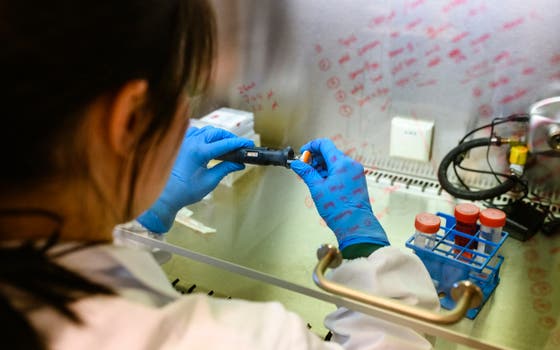Grant for research teams UMC Utrecht from ZonMw Open Competition

Five research teams of the UMC Utrecht receive a grant for projects in the framework of the ZonMw Open Competition. With this funding, the research teams can develop innovative team science initiatives that contribute to innovation within fundamental (bio)medical science and long-term health care. Within all projects, the research teams collaborate with other knowledge institutions. A total of 29 projects were honored for an amount of 23 million euros.
A total overview of the research teams receiving this grant:
Prenatal infection effects on early development - brain, cognitive and behavioural outcome (PRINDOUT)
Patricia Bruijning-Verhagen and Marieke De Hoog, UMC Utrecht
When a pregnant woman becomes ill due to an infection (such as a cold, flu, or COVID), it can impact her baby's development. We believe that the infection disrupts the wiring of the baby's brain, leading to difficulties in focusing attention and potentially resulting in behavioral issues. To investigate this, we will first examine the type and severity of potential infections through the blood and saliva of pregnant women. We will combine this information with data collected from their babies up to the age of three regarding the development of their brain networks, attention, and self-control. We can do this by integrating knowledge from various fields: developmental psychology, pediatrics, epidemiology, and immunology. Ultimately, we hope that this research will allow us to provide better guidance to pregnant women and to be able to assist children facing behavioral issues.
Clinical relevance of bacteriophage defence mechanisms. On the way to effective bacteriophage therapy
Pieter-Jan Haas, UMC Utrecht
Bacterial antimicrobial resistance is an emerging health threat severely limiting treatment options for bacterial infections. A promising alternative antibacterial strategy is the use of bacteriophages. Bacteriophages are viruses that infect and efficiently kill bacteria. Bacteria have evolved defense mechanisms to protect them from phage infection and bacteriophages, in their turn, have acquired counter defense systems. Last couple of years many new defense and counter-defense systems were identified. We recently described that clinical strains of the Pseudomonas aeruginosa, a common multi resistant pathogen, accumulates phage defense systems to make them resistant for many different phages. Phage infection can also have an effect on bacterial virulence and antibiotic susceptibility. In this project we will study the role of defense and counter-defense systems on phage infection and bacterial response. This is essential in order to develop effective phage therapeutic strategies.
SPatial Heterogeneity of INtratumoral drug distribution (SPHINx)
Roel Deckers, UMC Utrecht
More and more people are living longer with cancer, or even cured of it, thanks to the development of new and better treatments. Yet there is still a large group of patients in whom these new treatments fail. For effective cancer treatment, drugs must reach all cancer cells in the body. However, tumors have aberrant anatomy and physiology that can interfere with the supply and distribution of drugs. The goal of this project is to use advanced imaging techniques, such as MRI and ultrasound, to measure drug distribution and tumor characteristics that determine this drug distribution within the tumor at different length scales. A window-of-opportunity clinical trial will be performed in postmenopausal patients with early ER+ breast cancer, who are scheduled for surgery. The new knowledge provides a valuable basis for strategies improving drug distribution and ultimately patient outcomes.
ELECTRODE (Canine dilated cardiomyopathy patients for longitudinal biomarker discovery)
Pim van der Harst, Marco Guglielmo, Arco Teske, Klaus Neef, Peter van Tintelen and Magdaléna Harakalová, UMC Utrecht and Frank van Steenbeek, Utrecht University
ELECTRODE strives to develop biomarkers for the early detection of dilated cardiomyopathy (DCM). DCM is a serious heart condition that can affect both humans and dogs. The project combines advanced imaging techniques with blood biomarker research to identify the initial signs of DCM. Traditionally, scientists used difficult-to translate animal models such as mice, rats, and pigs to study DCM. However, this research offers an innovative approach by utilizing naturally occurring DCM in dogs as a relevant model. This allows us to accelerate the development of effective screening methods and treatments. This research has the potential to have a significant impact on the health of dogs and may ultimately lead to similar advances in human cardiology. It is a crucial step in the fight against DCM and offers new perspectives for early intervention and prevention.
b3D-AGM, a bioengineered cradle to produce bona fide hematopoietic stem cells in vitro
Catherine Robin, Hubrecht institute and Riccardo Levato, UMC Utrecht
Blood stem cell (BSC) production is a vital process for maintaining a healthy blood system and enabling life-saving treatments like BSC transplantations. Producing BSCs in the laboratory would revolutionize medical treatments by providing transplantation options for nearly all patients in need. Yet, much remains to be learned about the generation and growth of BSCs. Research in this area has faced significant challenges due to limitations in studying the native birthplace of BSCs within embryos, known as the aortagonad-mesonephros (AGM), and the absence of suitable laboratory models. To overcome these obstacles, we are pioneering an innovative 3-dimensional bioprinting technology, crafting miniature artificial replicas of the AGM (b3D-AGM). We will use b3D-AGM to explore how flow, environmental cues, and various shapes influence BSC production. Our work will form the foundation for groundbreaking discoveries and will ultimately aid to produce BSCs in our b3D-AGM mini-factories. Read more about this research project >
Purpose of the ZonMw Open Competition program
The goal of the ZonMw Open Competition program is to create space for curiosity-driven and creative collaboration that leads to groundbreaking science. To this end, the program is specifically intended for researchers from two or more disciplines that promote excellent team science in a synergistic manner. Applications are therefore reviewed and ranked on these points using the criteria of relevance and quality. Because knowledge utilization and participation are also important criteria, all honored applications have a convincing plan for knowledge utilization and participation appropriate to the objective of the research.
